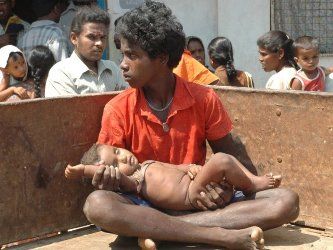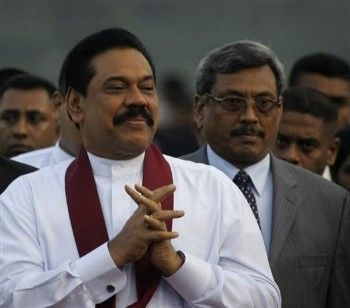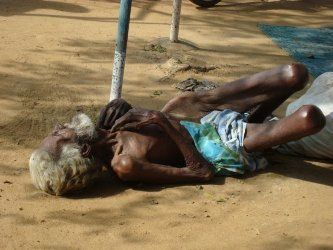
Publisher:
Bonnie King
CONTACT:
Newsroom@Salem-news.com
Advertising:
Adsales@Salem-news.com

~Truth~
~Justice~
~Peace~
TJP
Nov-25-2011 03:17

 TweetFollow @OregonNews
TweetFollow @OregonNews
Sri Lanka has gone down the dangerous path of ethnic fratricide
Brian Senewiratne Special to Salem-News.comThe problems in Sri Lanka today, extend well beyond the ethnic crisis.
 The war wounds are yet to heal with hundreds of orphans, widows, and destitute left at the mercy of a racist regime (Photos courtesy: http://www.warwithoutwitness.com) |
(BRISBANE, Aust.) -  There had been no civil war in Sri Lanka but only virulent pogroms against the Tamil people, says Brian Senewiratne, the Sinhalese doctor in Australia, in this second part of a series for TWL. You can read the first part here.
There had been no civil war in Sri Lanka but only virulent pogroms against the Tamil people, says Brian Senewiratne, the Sinhalese doctor in Australia, in this second part of a series for TWL. You can read the first part here.
The Nobel Laureate, Archbishop Desmond Tutu, when I met him in Cape Town, remarked, “Isn’t it wonderful that a Sinhalese should be campaigning for the Tamils for all these years?”
I said that I did not think it ‘wonderful’ because this was not a Tamil problem or a Sinhalese problem but a humanitarian problem that must arouse the concerns of every one who opposes the violation of basic human rights set out in the UN Human Rights Convention.
This is what it means to share the world with others who, like us, are going to be on this planet for but a short time. The principle that has guided my actions all these years is “Do unto others as we would have them do unto us”.
This simple truth transcends nations and peoples – that isn’t brown or black or white, that isn’t Christian, Buddhist, Hindu or Islam, that isn’t Sinhalese or Tamil. It is not new, but has beat in the hearts of billions of people since the dawn of civilization.
The world is heading down a hugely dangerous path of injustice and a failure “to do unto others as they would have done unto themselves”.
 |
Sri Lanka has gone down an even more dangerous path of ethnic fratricide, genocide, the dismantling of Democracy and its replacement by a Totalitarian State, corruption, indeed, ‘mega-corruption’, lawlessness, interference with the legal process and even with the Constitution and written Laws, the abuse of fundamental human rights of its people by the State, gross economic mismanagement, abysmally poor governance, and a violent nation where all problems are ‘settled’ by the State by unleashing violence delivered by State ‘Security Forces’, the Police, gangs of hoodlums and paramilitary groups working with the Government, where there is no accountability of any sort. It is a drift of the country to a Failed State.
 Pres. Majinda Rajapaksa - Photo: transcurrents.com |
It is often stated (wrongly) that there has been a ‘civil war’ in Sri Lanka for three decades. There has been no ‘civil war’ in post-Independence Sri Lanka. What there has been are a series of increasingly virulent pogroms against the Tamil people by a succession of Sinhalese–dominated governments, assisted by Sinhalese political opportunists from the entire Sinhalese polity, and ethnoreligious chauvinist bigots among the politically active Buddhist monks, and conducted by Sri Lankan Armed Forces (99% Sinhalese), with a degeneracy of Sinhalese society and its rapid descent to barbarism.
This ‘descent to barbarism’ has now been documented in the UK Channel 4 video. The entire objective is to force the Tamil people to accept Sri Lanka as a Sinhala- Buddhist Nation.
The problems in Sri Lanka today, extend well beyond the ethnic crisis. This ‘spectrum of crises’, of which the problems faced by the Tamils is only a part, however, threatens the survival of the entire Tamil Nation.
Let me highlight some of the recent (mostly) international publications by credible groups (all of which are in the public domain), and add a brief comment on the Agenda of the Sri Lankan regime, some serious problems in governance, and suggest a way forward.
This ‘way forward’ is becoming increasingly difficult and could well have reached the point of no return, at least in the short, or even medium, term.
Here are the most important documents to date (October 2011), most of them published this year.
1. Report of the Secretary-General’s Panel of Experts on Accountability in Sri Lanka. 31 March 2011.
This is a 124 page detailed Report looking at the last stages of the ‘war’ (September 2008- May 2009). It is the most serious indictment of the Sri Lankan government ever published.
It repeatedly accuses the Sri Lankan government of lying. “The Panel’s determination of credible allegations reveals a very different version of the final stages of the war than that maintained to this day by the Government of Sri Lanka.”
It recommends that the Secretary General, “should immediately proceed to establish an independent international mechanism whose mandate should be to collect and safeguard for future use, information provided to it…”.
For Secretary General Ban ki-Moon to claim that he has no power to implement the recommendations of his Panel of Experts is arrant nonsense. If he is powerless to act why did he appoint the Panel?
The implication was that he was expecting a Report exonerating the GoSL of wrong-doing. We have a right to know what Mr Boon’s agenda is.
If he cannot (or more likely, will not) act, then the Report must be submitted to the UN itself for action. If Mr Moon refuses to do so, then it is up to the member nations of the UN to demand that the Report be tabled.
This is where the expatriate Tamils (and others) have a critical role to play – to pressure their Governments to get their UN representative to act.
 End Israel's Unwarranted Murder of Kids |
This must be done urgently so that the UN Human Rights Council at its next meeting (March 2012) can put Sri Lanka on the Agenda. I am aware that the Head of this Council, Navaneetham Pillai, who has always stressed the need for an international independent Inquiry, has welcomed the Report.
An important point is that the mandate of the Panel of Experts was to assess the ‘nature and scope of alleged violations’, not to do any fact-finding or investigations. In view of the seriousness of the findings in their Report, it is imperative that this Panel be now asked to do a fact-finding investigation.
There is provision under R2P (Responsibility to Protect) – a set of principles which set out the responsibility of sovereign States – for the UN to act. R2P was adopted by the UN General Assembly in October 2009, with none other than Ban ki-Moon himself, playing a key role.
If a State fails to protect its citizens, then R2P states that the international community, “as a last resort”, can intervene with military force.
Sri Lanka, a signatory to R2P is certainly not protecting a significant number of its citizens (those in the North and East). Words must mean something, and if the words in R2P are to mean anything, then the international community must act. It is our business to exert the necessary pressure on our governments to see that the UN acts.
2. Situation Report. North and East (of Sri Lanka) Tabled in the Sri Lankan Parliament on 21 October 2011 by the Tamil National Alliance
This 29 page Report, is the most comprehensive document that sets out the current situation on the ground in the Tamil areas. It exposes what the GoSL is struggling to conceal by excluding international observers and human rights groups from the North and East.
It is one of the most disturbing Reports I have ever read on the human rights situation in Sri Lanka, and explodes the myth propagated by the Government that the Tamil people have been ‘liberated’ from the ‘clutches of terrorists’ and have now been ‘rehabilitated’.
It is a Report that must be circulated to all the UN countries, in particular, those that support Sri Lanka, the ‘aid-givers’, and the Media, none of whom are able to have free and unaccompanied access to the Tamil areas, and to talk to the supposedly ‘rehabilitated’ people.
3. “Sri Lanka: Post-War Progress Report. International Crisis Group 15 September 2011
This is an outstanding 9-page Report which challenges every claim that the GoSL has made. It states the many Government claims and then proceeds to demolish them by stating the real situation.
 Colombo cut off food and medical supplies to Tamil |
It states, “There are strong grounds to question the government’s claim of progress on crucial post-war issues such as the state of emergency and repressive anti-terrorism laws, militarisation and insecurity, resettlement of internally displaced persons (IDP), reintegration of alleged ex-combatants and a political settlement on devolution and minority rights”. It alarmingly goes on, “the risk of an eventual return to violence is growing again”.
This is a ‘must-read’ document by an internationally credible group.
4. “When will they get Justice?” Amnesty International (September 2011)
A 67 page Report by the Nobel Prize winning human rights group, sets out the “Failures of Sri Lanka’s Lessons Learnt and Reconciliation Commission (LLRC”).
It makes nonsense of the claim that an Independent International Commission of Inquiry should be considered after the LLRC Report is published (probably November 2011). AI has already shown that the LLRC is deeply flawed so that its findings lack validity.
It starts by drawing attention to Sri Lanka’s abysmal track record where Commissions (of Inquiry) are concerned. “….in the face of domestic and international pressure, including from such allies as India, the Sri Lankan government has still refused to make a credible effort to seek accountability. Instead, as it has done often in the past two decades, the Sri Lankan government has established an ad hoc special commission, ostensibly to investigate and address wrongdoings, but in fact to deflect international pressure and silence internal critics”.
It goes on, “Amnesty International urges the international community not to be deceived that the LLRC – the latest of a long line of failed domestic mechanisms in Sri Lanka – will deliver justice, truth and reparations”.
It calls for the UN to immediately establish an independent, international investigation and goes on to state why this is needed.
 |
5. “Sri Lanka: Briefing to Committee Against Torture. Amnesty International (October 2011)
This 31 page Report also by AI, covering the period 2010-2011, was submitted to the “Convention against Torture, other Cruel, Inhuman or Degrading Treatment or Punishment” in October 2011.
It documents the ongoing torture by Sri Lankan Government bodies (Police, and paramilitary groups working with the Government), the fabrication of evidence by the Police, and the complete failure of the Judicial system to address these.
Of greatest concern is the frequency of all this: “Perhaps the most shocking aspect of the criminal justice system is the overwhelmingly large number of charges which are fabricated by the police on a daily basis”. Far from being the exception, these now seem to be the norm.
Of interest to those of us who live in countries where asylum seekers arrive, is the section that describes (with a case study) the risk of torture for failed asylum seekers. (to be contd..)
Dr. Brian Senewiratne (MBBS Hons (Lond) MD (Lond), FRCP (Lond), FRACP) is a Sinhalese doctor currently based in Australia
Also Read
Brian Senewiratne’s Sri Lanka Series – Part I
Special thanks to The Weekend Leader
http://www.theweekendleader.com/page.php?id=834&title=Virulent-pogroms&h=
 |
Articles for November 24, 2011 | Articles for November 25, 2011 | Articles for November 26, 2011

Quick Links
DINING
Willamette UniversityGoudy Commons Cafe
Dine on the Queen
Willamette Queen Sternwheeler
MUST SEE SALEM
Oregon Capitol ToursCapitol History Gateway
Willamette River Ride
Willamette Queen Sternwheeler
Historic Home Tours:
Deepwood Museum
The Bush House
Gaiety Hollow Garden
AUCTIONS - APPRAISALS
Auction Masters & AppraisalsCONSTRUCTION SERVICES
Roofing and ContractingSheridan, Ore.
ONLINE SHOPPING
Special Occasion DressesAdvertise with Salem-News
Contact:AdSales@Salem-News.com

Salem-News.com:
googlec507860f6901db00.html

Terms of Service | Privacy Policy
All comments and messages are approved by people and self promotional links or unacceptable comments are denied.
[Return to Top]
©2025 Salem-News.com. All opinions expressed in this article are those of the author and do not necessarily reflect those of Salem-News.com.